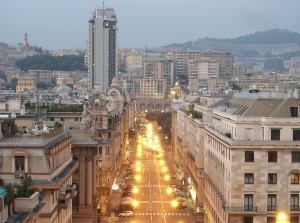NEWS Italian teachers in Genoa get training on Judaism
The Jewish community of Genoa, in collaboration with the Union of the Italian Jewish Communities (UCEI), has organized a training course for teachers, which is taking place between October 3 and December 10.
The course is aimed at providing teachers with both basic and in-depth knowledge of Jewish history and Judaism’s complex structure.
“This initiative started off with some Genoese teachers who showed interest in gaining further knowledge on Jewish history and traditions, which they could then make use of when dealing with the Remembrance of the Holocaust with their students. It is quite significant that the teachers themselves asked for such a training course,” highlighted Saul Meghnagi, project coordinator for UCEI, pedagogist, and former President of Istituto superiore per la Formazione of Rome.
“This training course represents an opportunity to start focusing more on Judaism rather than on the Holocaust, which is only a small part of our millenary history”, Meghnagi explained.
The course’s main target is to provide teachers with the right tools to illustrate to their students Jewish identity and tradition in all their aspects, from both a religious and a laical perspective.
“Too often, many young people use the word ‘Jew’ as an insult, without even knowing what it actually means”, said Danielè Sulewic, project coordinator for the Jewish community of Genoa.
“This course could represent an opportunity to clarify some concepts and to raise awareness going above and beyond the Holocaust Memorial Day, which is still a meaningful date, but has now become almost obsolete,” he added.
The teachers will follow a two-year-program, 6 sessions of which are taking place in 2019, each with a different lecturer.
“Jews: Nation, People, Religion” was opened by a session delivered by Meghnagi (October 3); Rabbi Roberto Della Rocca, the director of UCEI’s Culture and Education Area will deal with written and oral Torah (October 30); CDEC director Gadi Luzzato Voghera will analyze the topic “Anti-Judaism and anti-Semitism” (November 27); the closing event for 2019 will be held by Ariel Dello Strologo, President of the Jewish community of Genoa, who will be dealing with “Jewish culture: the Book” (December 10). It will also be possible to take part to individual events, without following the whole training course. “I do not believe in the power of coercion. I’d rather try and arouse interest”, Meghnagi explained.
The course will also include innovative ways to introduce participants to Judaism, e.g. encouraging their artistic sensibility. Teachers will have the chance to attend the exhibition “Travel in the Jewish world with Emanuele Luzzati,” organised by Danielè Sulewic (November 6).
“Luzzati’s drawings provide visitors with an innovative and visual representation of Jewish life, portraying the various traditional celebrations or the roles of some Torah characters, for instance”, Sulewitch said.
He also stressed the fact that organising and holding the training course in Genoa has been “very challenging for such a small community, but the project was supported by the whole city council and implemented with the valuable contribution of many voluntary workers.”
“We hope that our project could become a model to be adopted by other Italian cities, since it can definitely bring a positive contribution throughout Italy”, Saul Meghnagi added. “Many people want to open up the debate concerning Judaism on something more than the Remembrance of the Holocaust, which is still a fundamental element but must be joined by other aspects.”
“We hope that both teachers and students will be enriched by this learning path,”President Ariel Dello Strologo said when presenting the initiative, “and further realize that Jewish culture has always been at the root of European culture as well as a source of stimuli for both the European and many other cultures. Therefore, it is no coincidence that careful observation can reveal connections and recurring elements between them.”
Translated by Sara Facelli and revised by Claudia Azzalini, both students at the Advanced School of Modern Languages for Interpreting and Translation of Trieste University and interns at the newspaper office of the Union of the Italian Jewish Communities.

